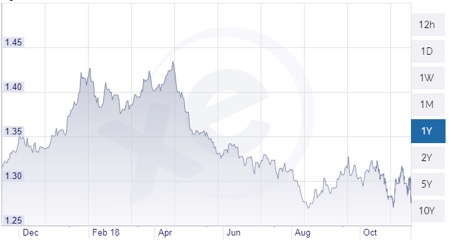As the Brexit deadline draws ever closer, it remains to be seen whether London will keep its place as the top financial centre in the world as is currently recognised by traders world-wide, but this could all depend on how the negotiations with the European Union proceed. Here, we’re going to explore the consequences that could well occur when Britain eventually do leave the EU and the effect that it is set to have on the UK’s international financial relations.
Politics Dictate Economics
Before we evaluate Brexit’s impact on the UK’s economy, we first need to consider what effect a country’s politics has on its standing in the international financial sector and, according to ongoing research, that impact is vast. Politics are now more than ever dictating economics, with recent research from HSBC finding that major changes in a single country’s political climate can lead to huge fluctuations in global financial currency markets.
Donald Trump’s administration sets the perfect example of what Brexit might mean to London; during his inauguration, the dollars’ worth fell to the worst it had been since January 1987, losing around 2.6% of its value when compared to other currencies.
This fluctuation seems to be reoccurring with Brexit as well, though both in the same and opposite directions. For example, upon announcement that Britain would not begin the formal negotiations required for leaving the EU without first having a vote in Parliament, the pound then proceeded to rise in value.
Brexit’s Impact Through 2018
So, now that we have clarified that a country’s political status also impacts on its economy, let’s take a look at how the UK and specifically the pound has been fairing throughout 2018 as the 29th March deadline draws closer:
Until around the mid-point of this year, Brexit didn’t really seem to be having much of a significant influence over the UK’s financial centre, but as the prospect of leaving the European Union without a deal was becoming more and more of a reality, investors began to panic.
This culminated in July in which Theresa May reiterated her stance that no deal was better than a bad one in an impassioned speech she delivered to parliament. The pound which had already been in steady decline since April subsequently fell by 6% as the market began to take a more bearish approach to sterling. Since then the UK’s standing and London’s position as one of the top financial centres in the world seems to have levelled out, but there is still much uncertainty moving forward as the time runs out for the UK government to attain a positive trade deal.
Exchange Rate Of GBP Against USD: Source: https://www.xe.com/currencycharts/?from=GBP&to=USD&view=1Y
What Brexit Means For The UK Economy
If the UK fails to attain a deal before March next year, then Brexit will likely lead to London’s position as one of the top financial centres in the world being placed in to jeopardy as the British economy will undoubtedly begin to falter. This will be a direct result of the UK having to leave the European Customs Union, which would mean a significant increase in the control of UK-manufactured goods making their way into other European countries. This could ultimately lead to sluggish delays and a decrease in international profits.
The British Retail Consortium (BRC) also believes that leaving the EU will lead to a price hike in imported items from the Europe, predicting a 29% increase in food and beverage products as well as a 7% increase for non-food items, clothing and textiles. Pricier imported goods will not only effect businesses in the way that they purchase items from Europe, but also put a strain on consumer spending with both impacting the UK economy as a whole.
What Brexit means for International Trade
Until recently, the chances of an amicable breakup between the UK and the European Union looked increasingly unlikely and, as a result, Britain’s international trade suffered. It appears that much of the foreign trading that was once solely the UK’s is now being enjoyed by other European countries after the validity of the UK’s economy has been questioned.
From June 2016 through to March 2018, cross-border lending from the UK was actually steadily increasing to a total of $316 billion according to the Bank for International Settlements – a pretty impressive figure considering the immediacy of the referendum.
However since March of this year, cross border lending has decreased by more than 30%. By most recent estimates completed by Bloomberg, cross border lending has declined by a total of $129 billion, which is the most substantial drop in three years.
Over a quarter of international revenue has been lost from the UK economy and so the question that remains is this – where has it gone? Well, in that same period, France has enjoyed a cross-border lending increase of $93 billion and the Netherland’s, a $16 billion increase, consistent with the theory that London’s loss will be Paris’ and Amsterdam’s gain.
Looking Ahead
Although an official draft deal was recently announced between the UK and EU, there is still much uncertainty regarding London’s future as a top financial centre in the world, with the agreement coming under much scrutiny.
MP’s leaving their posts, sterling devaluing and English bank’s stock slumping are just some of the aspects of the turmoil since the draft deal was announced. At the time of writing, the pound is down two cents against both the euro and the dollar, the Royal Bank of Scotland and Barclays have dropped by 7% in the stock market and there have been several departures from Theresa May’s cabinet.
We can only hope that Brexit’s overall impact is not as severe as early events indicate. We hope that our article has served as a valuable resource to help you understand what Britain leaving the EU might mean for London as the top financial centre in the world
 Australia
Australia Hong Kong
Hong Kong Japan
Japan Singapore
Singapore United Arab Emirates
United Arab Emirates United States
United States France
France Germany
Germany Ireland
Ireland Netherlands
Netherlands United Kingdom
United Kingdom






Comments are closed.